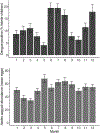Climate change could shift disease burden from malaria to arboviruses in Africa
- PMID: 32918887
- PMCID: PMC7490804
- DOI: 10.1016/S2542-5196(20)30178-9
Climate change could shift disease burden from malaria to arboviruses in Africa
Abstract
Malaria is a long-standing public health problem in sub-Saharan Africa, whereas arthropod-borne viruses (arboviruses) such as dengue and chikungunya cause an under-recognised burden of disease. Many human and environmental drivers affect the dynamics of vector-borne diseases. In this Personal View, we argue that the direct effects of warming temperatures are likely to promote greater environmental suitability for dengue and other arbovirus transmission by Aedes aegypti and reduce suitability for malaria transmission by Anopheles gambiae. Environmentally driven changes in disease dynamics will be complex and multifaceted, but given that current public efforts are targeted to malaria control, we highlight Ae aegypti and dengue, chikungunya, and other arboviruses as potential emerging public health threats in sub-Saharan Africa.
Copyright © 2020 The Author(s). Published by Elsevier Ltd. This is an Open Access article under the CC BY 4.0 license. Published by Elsevier Ltd.. All rights reserved.
Conflict of interest statement
Figures



Comment in
-
Arboviral diseases: the emergence of a major yet ignored public health threat in Africa.Lancet Planet Health. 2020 Dec;4(12):e555. doi: 10.1016/S2542-5196(20)30269-2. Lancet Planet Health. 2020. PMID: 33278372 No abstract available.
References
Publication types
MeSH terms
Grants and funding
LinkOut - more resources
Full Text Sources
Medical

